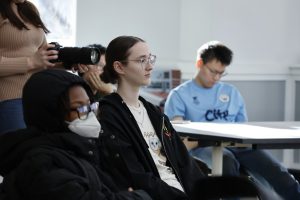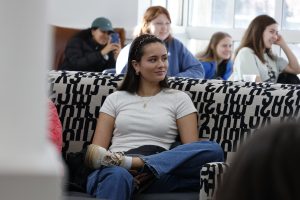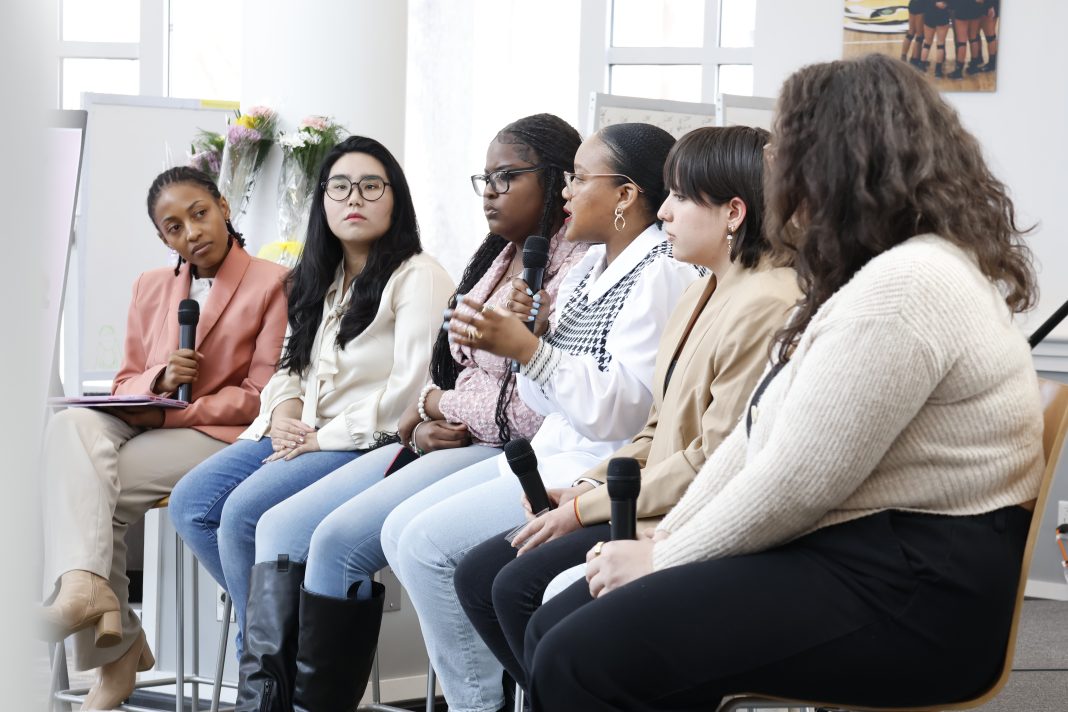On Friday, Mar. 7, student leaders gathered in the UB Living Room for DePauw’s International Women’s Day Panel hosted by International Student Affairs and the Women’s Center. The “Accelerating Action” discussion provided a platform for women to share their experiences with gender awareness, leadership and community. Panelists reflected on their personal stories while highlighting campus resources, support networks, and practical advice for navigating both the challenges and opportunities of student life at DePauw. The panelists were Johanna Cassaigne ‘28, Nushla Pradhan ‘26, Lineo Khoete ‘25, Julia Nguyen ‘25, Ava Rennard ‘26 and Mikayah Cheeks ‘26. Membi Mtsi ‘27 moderated the discussion.
Mtsi opened the discussion by asking panelists about their earliest experiences with gender awareness. Cassaigne, from Mexico City, recalled how her brother had more freedom while she faced restrictions for safety reasons. “That was the moment I realized gender would impact what I was allowed to do,” she said.
For Pradhan, growing up in Nepal meant witnessing rigid gender roles from an early age. She described how women handled all domestic work while men remained uninvolved: “That was when I realized how deeply rooted gender expectations were in my culture.” Her experience reflects broader trends—across South Asia, women consistently spend more time than men on unpaid domestic and care work, according to the World Bank’s Gender Data Portal (2010–2022). This imbalance contributes to the region’s economic gender gap, with female labor force participation at just 31.6% compared to 77% for men.
The conversation then shifted to leadership and self-care. Many panelists discussed the challenge of balancing responsibilities with well-being as campus leaders. Cheeks, president of Alpha Kappa Alpha Sorority, Inc., highlighted the tendency of women to overcommit at the expense of their health. She wished she had prioritized her mental health earlier and encouraged others to do the same. Nguyen, a member of the Women’s Center and the Management Fellow Program, pointed out that DePauw offers free counseling, but many students don’t take advantage of it. She emphasized the importance of accessing mental health resources and recognizing their value.
The panelists also addressed gendered challenges in leadership, particularly the scrutiny women face compared to men. Khoete, president of the African Students Association, shared how she has had to work harder to establish her authority. “Even as the president of an organization, people sometimes bypass me and direct their questions to a man instead. At first, I thought maybe I wasn’t clear enough, but then I realized it wasn’t me, it was gender bias,” she said. Rennard, president of Delta Gamma, added that women often feel the need to over explain their decisions to be taken seriously.




Despite these challenges, the speakers championed the power of sisterhood and support networks. Cassaigne emphasized that women looking out for each other, especially in social settings, can significantly enhance safety and well-being. Small actions, like checking in on one another at events, contribute to a safer and more supportive environment. This concept aligns with “micro-feminism,” where everyday actions, like acknowledging women’s contributions in meetings or advocating for fair work policies, collectively create a more inclusive environment.
Khoete built on this idea, highlighting the emotional depth of female friendships, which she described as a source of unwavering support and connection. She reflected on how women create safe spaces for each other, forming bonds that provide comfort and understanding in ways she believes men may not experience. Pradhan extended this conversation to the professional sphere, particularly in male-dominated fields like computer science. She emphasized how finding allies among other women has been essential in navigating such spaces, sharing that whenever she enters a classroom and sees only a few other women, there is an unspoken understanding that they will support one another.
As the discussion came to a close, the panelists reflected on what they wished they had known earlier. Rennard encouraged students to pace themselves and not feel pressured to do everything at once, while Cheeks spoke about self-worth and confidence. Nguyen emphasized the importance of networking and establishing meaningful professional connections. She encouraged students to engage with alumni, maintain connections and confidently seek new opportunities. “Networking isn’t just about what you know—it’s about who you know,” Nguyen stated.
The session concluded with a powerful message that while gender disparities persist, small and consistent actions can create lasting change. The speakers encouraged attendees to be bold, supportive and confident for a more inclusive world. Mtsi closed with a reminder: “Women tend to doubt themselves more than men, but your voice matters. Find your tribe, uplift each other and never be afraid to go after what you want.”

